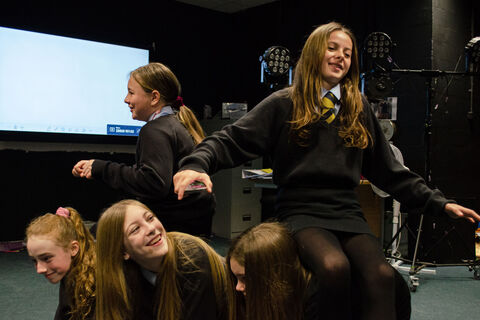Performing Arts Extra curricular 2022 2023


Music is a universal language and is something we all enjoy in one way or another. Drama encompasses all of life and we all spend a lot of time engaged in watching either TV, films, theatre productions or musicals. For some of us music and drama are also hobbies or a way to relax and unwind. Here at Ysgol Bryn Elian we strive to ensure that all pupils regardless of age, ability, need or talent enjoy and engage with music and drama as part of our school ethos of ‘Achievement for All’.
Our curriculum encompasses a wide range of topics and styles allowing pupils to experience music and drama from around the world and from other times. Pupils regularly take part in practical and creative work devising drama and composing music, which they then perform in class. We like to encourage pupils to be ambitious and many venture outside of school to demonstrate their performance skills taking part in events in the local community and further afield. Music and drama activities are scientifically proven to improve peoples physical and mental health, from helping with stress and anxiety to improving communication, self-esteem and confidence as well as being a great activity to do together. This can be seen in class lessons where pupils mainly work in groups or as a whole class, but also in the variety of extra-curricular activities we offer to all pupils. Pupils also have the opportunity to receive individual instrumental and singing lessons.
The subjects of Art, Drama and Music work together to enable learners to express themselves creatively and develop a myriad of skills.
Mrs M. Hildrew
Head of Department and teacher of Music and Drama
Mrs N. Pattullo
Teacher of Drama
Mr G. Rasmussen
Guitar, bass guitar and drum kit teacher
Mrs S. Pierce
Piano teacher
Mr S. Davies
Singing teacher
Mrs A. Williams
Violin teacher
Year 7
Pupils focus on learning the basics of drama, which involves developing their voices, facial expressions and body movements. They then use these skills along with learning drama techniques such as tableaux, physical theatre and hot seating as part of the Expressive Arts AoLE Medieval themed work (along with Music and Art). Pupils learn how to perform as Medieval characters, devise and create their own scenes and then learn how to perform scripted scenes from Medieval morality plays.
Year 8
Pupils focus on learning about melodrama (a style of drama found in plays and the silent movies of the 1930s) learning how to perform scenes as the hero, heroine or villain etc. They learn how to exaggerate their speech, facial expressions and movements in order to be able to portray these characters and, after learning how to perform stage combat, combine all this work to perform scenes from plays and films.
Year 9
Pupils focus on learning about theatre practitioners such as Stanislavski, Brecht and Berkoff, learning how these people influenced theatre performances and learning how to perform their techniques. Pupils are then introduced to the stage medium of semiotics and proxemics and begin to write, devise and create their own dramas using different stimuli, such as Banksy art works and newspaper reports etc.
Year 10 and 11
Pupils can opt to study for the WJEC GCSE Drama qualification. This involves pupils learning and then developing all the skills and techniques used in theatre and drama needed to create, develop and perform original work (created by the pupils) along with performing extracts from existing plays. Pupils regularly take part in workshops on theatre practitioners, physical theatre and stage combat taught by the class teacher and visiting actors. Pupils also learn how to analyse plays in different styles, review live theatre productions they have seen and take part in school shows.
Year 12 and 13
Pupils can opt study for the WJEC A-level Drama qualification. This involves pupils continuing to develop all the skills and techniques they have learnt at GCSE in order to be able to reinterpret extracts of plays when performing. Pupils take part in practical workshops learning about lighting, costume, make-up and stage design, which they then use in their own performances. Pupils also learn how to direct and interpret scripts, review live theatre productions they have seen and take part in school shows.
Music and Drama courses are both academic and practical in nature which reflects the career opportunities available to pupils in these multi-million-pound industries. Pupils are able to pursue careers as teachers, musicians, composers, sound engineers, producers, promoters, music therapists, actors, directors, make-up artists, lighting technicians and playwrights etc.
Performing Arts Extra curricular 2022 2023